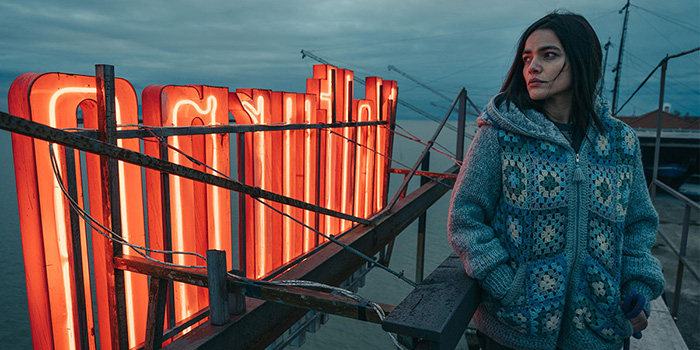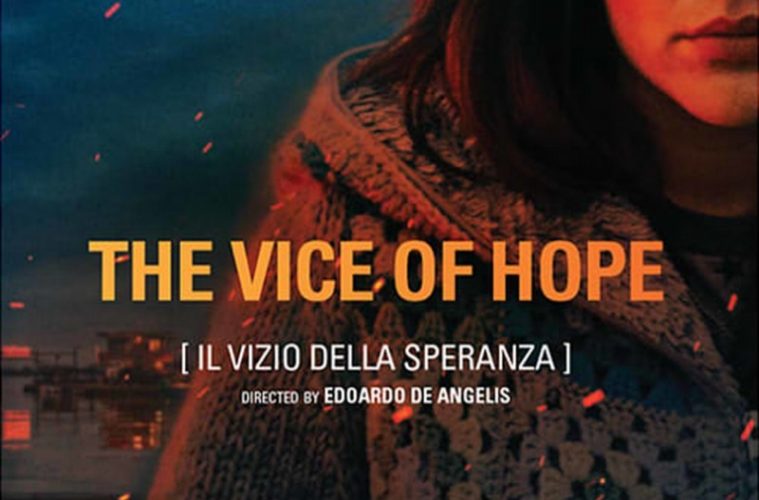Less than an hour from Naples, Italy is Castel Volturno, a place marred by newspaper headlines like “Forsaken Village” and “Sex, Drugs, and the Mafia.” It shouldn’t surprise then that director Edoardo De Angelis would use it as the setting for his latest film The Vice of Hope considering child trafficking and prostitution are prevalently at its back. These criminal enterprises are presented as this comune’s means for financial stability, everywhere we’re taken openly servicing one or both with little threat of consequences that aren’t personally enforced via the psychological trauma endured. This is the only life Maria (Pina Turco) knows and her own inability to bear children makes her a perfect, unsympathetic coyote to ferry those willing to sell their babies for survival.
We meet her as a teen floating in the river, motionless and broken. She’s plucked from the water by a man on a boat whose journey to shore is accompanied by angry bystanders pointing and yelling as though he didn’t just save her, the context for their vitriol and the details of what happened not arriving until much later. We can assume the worst, though. It’s why present-day Maria’s ruthless boss (Marina Confalone’s Mafiosa Aunt Mari) would never anticipate why she’s seemingly grown soft of late — so soft that she’s let one of her expectant wards disappear despite the money for her baby already having been paid. Somehow this prized trafficking lieutenant has miraculously discovered herself pregnant too. Suddenly Maria understands the emotional cost behind what she does.
This pregnancy is presented with obvious allusions to the Virgin Mary as Maria says there’s no father before also explaining that she didn’t realize she was carrying a child until three months later because she hates being naked. Whereas visitors came to shower gifts on the Son of God, however, Maria knows the baby is the gift everyone will want to take. This new life is a valuable commodity and Aunt Mari will do whatever’s necessary to make certain it’s healthy enough to sell if it isn’t terminated. The doctor says the odds that Maria will live through the delivery are long, so her boss wins either way. She retains her star smuggler if the decision is abortion and earns money off her progeny if not.
De Angelis throws us in as Maria’s life is instantaneously changed. We don’t know how long she’s been doing this work nor what happened to put her on the path. We do, however, meet her heroin-addicted mother (Cristina Donadio) to realize options are limited as well as a former “client” (four babies over) to recognize the heart-breaking duality in accepting the responsibility that comes with giving your child away and the aching regret of having done it. Maria therefore understands what’s at stake both in finding her missing incubator (Fatima) and choosing between her own life and her baby’s. So she seeks an impossible escape, meeting two kind souls in Virgin and Pengue (Massimiliano Rossi) whose mere existences instill hope to combat this shared world’s utter despair.

That’s a feeling that’s always been a liability in this village. Hope is a curse word to a community that treats human life as a resource to be bought, sold, and worked to the bone. And that’s why Maria’s predicament is so unique. She matured to adulthood resigned to the fact that having children wouldn’t be possible so the pregnancy itself becomes an eye-opening affair. How could she dream to not let a miracle be born? How could she fathom letting it be taken from her for profit? Maria is therefore faced with the same decision those other woman are, but on a deeper spiritual level. It’s not about giving the child a “good” life. It’s about life, full stop, and whose is worth sacrificing for the other.
Stay for a mid-credits scene to see the Jesus allegory in full view, but watch the rest for this woman’s strength and perseverance. Maria will ultimately escape only to find herself with no options but to return. She’ll be given ultimatum upon impossible ultimatum and inevitably be let down by those she thought she could trust. From start to finish this baby’s life becomes a fated lesson for its mother: one that will awaken her to the choices she can still make despite her past tragedy and her present environment. There’s always an opportunity to be better and do better and sometimes we need to be given a sign to accept this truth and the often-arduous journey it will take to prevail — if doing so is even possible.
It’s therefore a credit to the performances that we remain engaged throughout the hardship without any guarantees as far as how things may play out. De Angelis exposes this world to his audience with its disparate communities of black and white skin, its run-down dilapidation so close to a glamorous vacation destination, and its jaded inhabitants who have embraced dog-eat-dog motivations transcending even love. The little moments like the aforementioned former “client” speaking about her children, Fatima saying her child will come back to her, or the anguish shared by Pengue about all he’s lost without ever placing blame on the innocent child who sparked his fall are what linger. These people never thought to seek redemption until this unborn baby stirs something long-since buried within their souls.
The Vice of Hope premiered at the Toronto International Film Festival.

